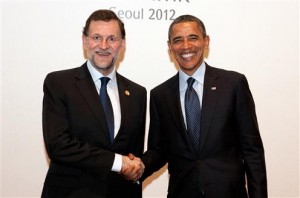
1. Blaming the previous government can only get you so far. The Socialists left the public accounts in mess, let unemployment soar, and failed to acknowledge the crisis in the first place…We’ve been hearing all that for the last two years or so from the Partido Popular (PP). And turning the Spanish economy around in the near future, given the state it was in at the end of 2011, is a tough –some would say impossible- task. So far the governing party’s own support has remained steady, according to polls, even if Rajoy’s has slipped slightly. But at some point very soon, Spaniards are going to stop thinking about Zapatero’s feeble economic legacy and start focusing exclusively on the performance of his successor.
2. You only need one economy minister. Luis de Guindos was an obvious choice for many as economy minister. But his influence and message seem at times to have been blurred by some of those around him, not least Cristóbal Montoro, the “finance minister”. Montoro is seen as a political figure while Guindos is more technical – in theory a workable combination. But such chemistry was not apparent when the two men offered differing figures for the 2011 deficit within hours of each other. It was a slip that was soon remedied, but at the time it looked confused and amateurish. Guindos has among the toughest challenges of all of Europe’s economy ministers – he doesn’t need others in his own Cabinet contradicting him on crucial matters.
3. Spain matters more than Andalusia. It took the new government three months to unveil its budget for 2012, which contained unprecedented spending cuts. The reason the administration gave for the delay was that it needed all that time to get to grips with the mess left by the outgoing Socialists. But nobody really believed that. The real reason was that on March 25, Andalusia was due to hold elections which the PP looked likely to win – at least if it kept its austere national budget under wraps until after the vote. But the plan backfired. The PP ended up winning the most votes in the region, but the Socialists nonetheless look set to extend their 30-year grip on power there through a left-wing coalition. During the wait for the budget, the rest of the country –and the rest of Europe– were left wringing their hands in anguish and anticipation and Spain became the focus of the eurozone crisis. As with his delay in announcing Cabinet appointments, Rajoy failed to realise the importance of shelving convention or political considerations and instead acting swiftly to deliver a clear message.
4. Make sure you know when the microphone is switched on. It’s happened to virtually every frontline politician at one time or another, including the likes of Nicolas Sarkozy and George W. Bush: they say something rash, overly informal or downright stupid and a TV mic picks it up and broadcasts the gaffe. In Rajoy’s case, he was merely stating the obvious: the labor reform law, he told his Finnish counterpart, Jyrki Katainen, would “cost me a general strike.” Of course it would, but once he said that, it almost felt as if the unions sensed they had no choice but to strike. It also raised the broader point about Rajoy’s communication strategy. So far, he has continued where he left off as leader of the opposition: with an almost pathological aversion to giving press conferences or public statements, leaving much of that to his number two, Soraya Sáenz de Santamaría. If he is to make a dent in the notion that he is governing at the behest of the European Commission and Angela Merkel, Rajoy needs to start addressing the people who voted him into office and explaining why he is taking such unpopular decisions.
5. Don’t smile. People voted Rajoy in with the perception that he was a dull but cerebral figure. Like Labour’s Gordon Brown in the UK, when he tries to stretch that image it can look forced or even unnerving. A harmless grin can easily look like a deranged glare. Keep frowning, Mr. Rajoy.
Leave a Reply
You must be logged in to post a comment.